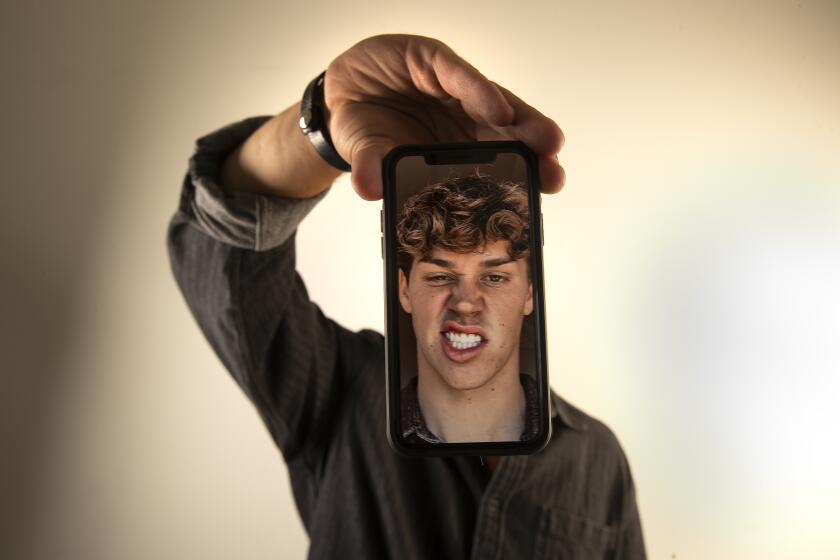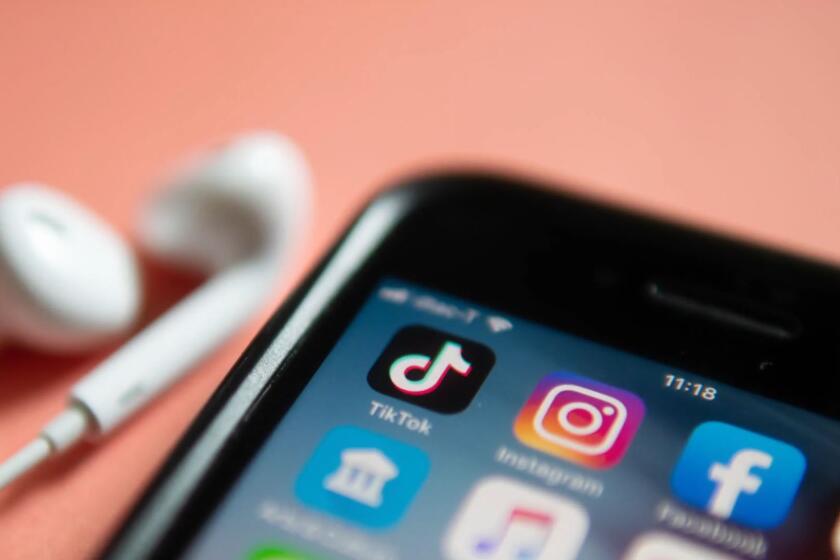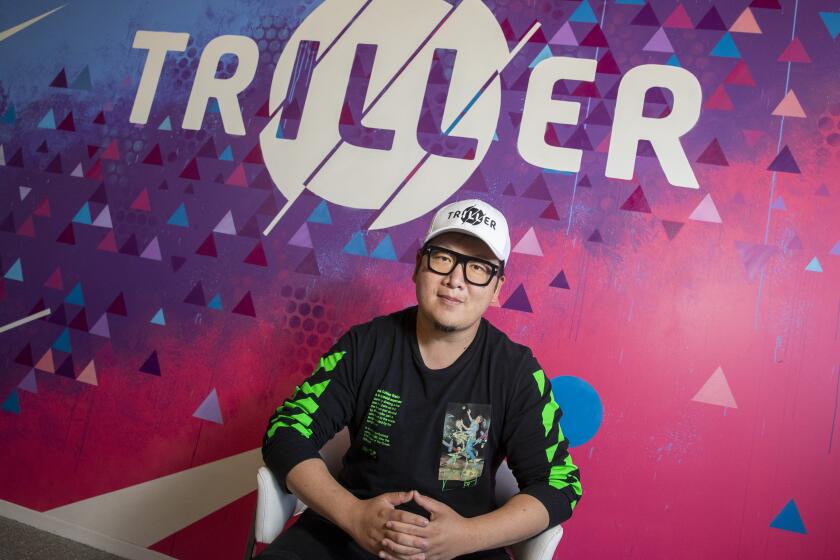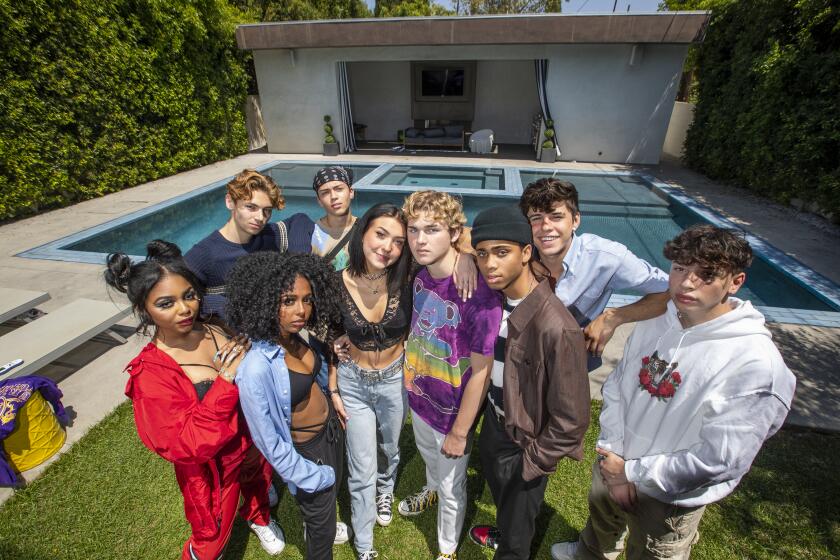TikTok sues Trump administration, calls ban unconstitutional
- Share via
TikTok on Monday sued the Trump administration, declaring that the president’s executive order against the popular video app and its Chinese parent company is unconstitutional.
President Trump signed an executive order earlier this month that would bar TikTok’s parent company, China-based ByteDance, from doing business with American businesses starting on Sept. 20.
The vague order could cause companies such as Apple and Google to pull TikTok from mobile app stores, block brands from placing ads on TikTok and potentially stop ByteDance from paying its U.S. employees, legal experts said. That has caused uncertainty among TikTok’s more than 1,500 U.S. employees and panic among some of its video creators.
TikTok said Trump’s order “has the potential to strip the rights of that community without any evidence to justify such an extreme action and without any due process,” the company said in a statement Monday. “We do not take suing the government lightly, however we feel we have no choice but to take action to protect our rights, and the rights of our community and employees.”
The lawsuit, filed by TikTok and ByteDance in federal court in Los Angeles, names as defendants Trump, the U.S. Department of Commerce and Secretary of Commerce Wilbur Ross.
U.S. Department of Justice spokeswoman Kerri Kupec declined to comment.
TikTok is under immense pressure as politicians in India, U.S. and Japan have raised concerns that ByteDance could be compelled to give user data to the Chinese government.
India has banned the app over such national security concerns, while Trump said he would support the sale of TikTok’s U.S. operations to an American company such as Microsoft, if some of the proceeds from the acquisition went to the U.S. Treasury Department. Microsoft has confirmed it is in discussions with ByteDance and that talks will conclude by Sept. 15. Other potential TikTok suitors include tech companies Twitter and Oracle.
The social video app faces growing scrutiny from the U.S. government, rising competition from rivals like Facebook and the defection of top creators.
The executive order, signed Aug. 6, threatens to end TikTok’s thriving business in the U.S., where it has become a key player in the entertainment industry and is used by 100 million Americans. Music artists and labels leverage the app’s creators to promote their songs, talent agencies use it to discover new talent and there are dozens of L.A. digital stars that make a living on TikTok through brand deals.
Globally, TikTok has exploded in popularity, with 689.1 million monthly active users in July of this year — up from nearly 55 million in January 2018 — the company said in its lawsuit.
“The order is very vague and ambiguous,” said Bryan Sullivan, a partner at law firm Early Sullivan Wright Gizer and McRae. “It does not provide any detail whatsoever as to the scope of the order and how far it would be applied.”
Trump issued the order under the International Emergency Economic Powers Act, which gives him the authority to regulate international commerce to address unusual or extraordinary threats, Sullivan said.
Trump said in his order that TikTok’s “data collection threatens to allow the Chinese Communist Party access to Americans’ personal and proprietary information — potentially allowing China to track the locations of Federal employees and contractors, build dossiers of personal information for blackmail, and conduct corporate espionage.”
TikTok said it has worked with the government’s Committee on Foreign Investment in the United States for nearly a year and believes its app does not threaten national security.
The company said the U.S. government did not provide evidence that it was an actual threat and has maintained that it has not given and will not give information to the Chinese government.
“The order is thus a gross misappropriation of IEEPA (International Emergency Economic Powers Act) authority and a pretext for furthering the President’s broader campaign of anti-China rhetoric in the run-up to the U.S. election,” the company said in its lawsuit.
TikTok has said that U.S. user data are stored in Virginia and backed up in Singapore and that it plans to open a transparency and accountability center in Culver City, where outside experts can see the code that powers the app’s algorithm and learn about how it moderates content.
On another legal front, TikTok technical program manager Patrick Ryan filed a separate lawsuit against Trump and Ross on behalf of the company’s U.S. employees, who are concerned they will not be able to receive a paycheck because of Trump’s order. Ryan’s lawsuit, filed Monday in federal court in San Francisco, also raises concerns for TikTok employees who are on H-1B visas and may have to leave the country if their jobs are terminated.
“It would have a significant impact because we have an employer that wants to pay us and we’ve done nothing wrong as employees and the order prohibits this,” Ryan said.
President Trump has signed an executive order that will ban the viral video app TikTok in the U.S. in 45 days. A separate order bans WeChat, the popular communications app owned by Tencent.
Mike Godwin, Ryan’s attorney, said his client has a strong case.
“It’s very rare to see those powers used to essentially destroy a company and deprive employees of the right to be paid — lawful employees have the right to be paid,” Godwin said.
The lawsuit also suggests that Trump may be targeting TikTok because some of its users had ordered tickets to attend a Trump rally in Tulsa with no plans to show up, causing attendance to be less than expected.
Trump also issued a second executive order Aug. 14 against ByteDance, requiring the company to divest its TikTok U.S. operations by Nov. 12.
The best outcome for TikTok would be a finding that Trump’s order is unconstitutional, but it could take months for the case to be resolved, Sullivan said. The clock would not stop on Trump’s order unless a judge grants a temporary injunction, he added.
“This is brutal for a lot of people who work at the company, who want to use what they learned to contribute to a great platform,” said Zhengqin Luo, an engineering manager at TikTok’s Mountain View office, adding that the company has drawn top talent in engineering in the Bay Area. “It’s sad for me to see this happening, for employees to have to bring a lawsuit .”
Triller, an L.A.-based video app, has received a big boost from security concerns and political churn around the blockbuster app TikTok.
Meanwhile, rival companies such as L.A.-based Triller, which operates a music video app, have gone on the offensive, poaching TikTok staff and some of its popular creators. For example, Raj Mishra, former head of strategy at ByteDance, has joined Triller as head of India operations.
The uncertainty is causing panic among some TikTok creators, who have urged fans to follow them on alternate video platforms including YouTube and Instagram. Several digital stars defected to Triller and joined as investors. Instagram earlier this month launched its own short-form video feature, Reels, which TikTok CEO Kevin Mayer called a “copycat product.”
L.A.’s TikTok creators earn thousands of dollars a month. Trump’s threat of a potential ban has them concerned.
To fend off rivals, TikTok announced the first 19 recipients of its $200-million U.S. creator fund. At least one creator received a six-figure deal over a year, according to a person familiar with the matter who declined to be named. The company plans to grow the fund to $1 billion in the next three years.
This investment has helped quell some of the anxiety among TikTok creators, many of whom rely on brand deals and promotions for their livelihoods.
Marketers have been working with TikTok stars to reach young audiences who spend lots of time on the app. Some brands have clauses in their contracts that if a TikTok ban were to happen, the content would be posted on Instagram instead, said Amy Neben, a partner at Los Angeles-based Select Management Group.
“If you’re not diversifying, you definitely have your head in the clouds,” Neben said. “None of the creators own any of these products, so it’s really on you to own your audience and to be able to pivot them.”
But TikTok executives maintain that the company plans to be around for a long time and that it continues to have the support of creators and employees.
“Our employees have the benefit of hearing and seeing what we’re working on, our commitment to our users,” Vanessa Pappas, TikTok U.S. general manager, said at the Vox virtual event “Pivot Schooled” earlier this month. “We’re attracting amazing talent every day.”
More to Read
Inside the business of entertainment
The Wide Shot brings you news, analysis and insights on everything from streaming wars to production — and what it all means for the future.
You may occasionally receive promotional content from the Los Angeles Times.















